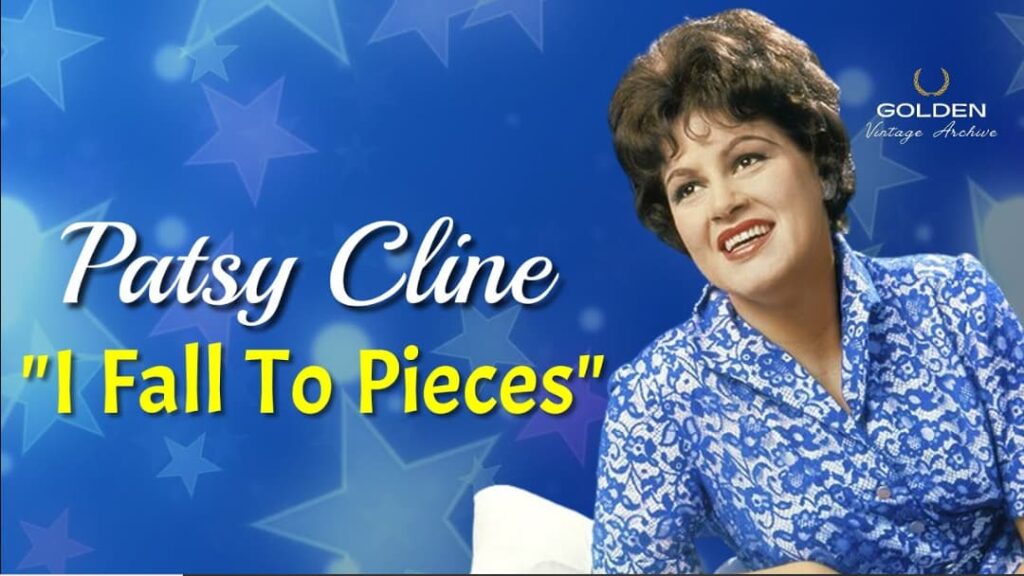
A Melancholy Masterpiece: The Enduring Heartbreak of “I Fall to Pieces”
Ah, Patsy Cline. Just the name itself conjures a swirling mist of sepia-toned memories, doesn’t it? A voice that could shatter glass with its power, yet mend a broken heart with its tender caress. Tonight, we turn our gaze to one of her most iconic and enduring works, a song that, for many, defines the very essence of country heartbreak: “I Fall to Pieces.” This wasn’t just a hit; it was a cultural phenomenon, a tear-soaked anthem that resonated deeply with millions. Upon its release in 1961, “I Fall to Pieces” didn’t merely climb the charts; it soared. It became Patsy Cline’s second number one single on the Billboard Hot Country Singles chart, solidifying her place as a bona fide superstar. But its reach extended far beyond the confines of country music, crossing over to become a Top 20 hit on the Billboard Hot 100, peaking at an impressive number 12. For many of us who remember those days, it was inescapable, pouring out of every radio, soundtracking countless quiet moments of reflection and shared sorrow.
The story behind “I Fall to Pieces” is as compelling as the song itself, a testament to the power of artistic collaboration and, perhaps, a touch of stubborn defiance. Written by the legendary songwriting duo of Hank Cochran and Harlan Howard, the song initially faced resistance from Patsy Cline. Imagine that! A song that would become so indelibly linked to her, almost rejected. Reportedly, she wasn’t fond of the pop-leaning arrangement initially presented to her, feeling it strayed too far from her country roots. It’s a testament to producer Owen Bradley’s vision, and perhaps his gentle persistence, that Cline eventually relented. The magic truly happened in the studio, where Bradley’s masterful production, with its signature “Nashville sound” – lush strings, smooth background vocals, and a polished sensibility – created the perfect backdrop for Cline’s unparalleled voice. The synergy between her raw, emotive delivery and the sophisticated arrangement was simply captivating, transforming a potentially straightforward country ballad into something truly transcendent. This was a pivotal moment not just for Patsy Cline, but for the evolution of country music itself, demonstrating its capacity to appeal to a broader audience without sacrificing its soul.
At its core, the meaning of “I Fall to Pieces” is one of profound, unrequited love and the utter devastation of seeing the object of your affection move on. The lyrics paint a vivid picture of a narrator who, despite witnessing their former lover with someone new, cannot escape the emotional wreckage. “I fall to pieces each time I see you again,” Cline croons, her voice brimming with a fragile vulnerability that is almost unbearable to hear. It’s not just a lament; it’s a confession of an enduring emotional attachment, a raw admission that logic and reason are powerless against the tidal wave of heartbreak. For those of us who have experienced that gut-wrenching sensation of seeing a past love happily ensconced with another, the song resonates with an almost uncomfortable accuracy. It speaks to the universal human experience of longing, loss, and the agonizing process of trying to heal a wound that stubbornly refuses to close. The song captures that particular ache of memory, the way a fleeting glimpse or a familiar scent can instantly transport you back to a time when everything felt right, only to be cruelly jolted back to the painful present.
Beyond its lyrical depth, the genius of “I Fall to Pieces” lies in Patsy Cline’s peerless vocal performance. Her delivery is a masterclass in subtlety and power, perfectly balancing a wounded fragility with an underlying strength. There’s a slight tremor in her voice, a catch that speaks volumes about the character’s suppressed anguish. She doesn’t just sing the words; she embodies the despair, the longing, and the quiet dignity of someone trying to hold themselves together while their world crumbles around them. It’s a performance that doesn’t rely on vocal acrobatics or histrionics; instead, it draws its power from raw, unadulterated emotion. This is why, even decades later, the song continues to hold such sway over listeners. It taps into a timeless vein of human experience, reminding us that heartbreak, while deeply personal, is also profoundly universal. For many, “I Fall to Pieces” isn’t just a song; it’s a cherished memory, a soundtrack to moments of both personal sorrow and shared comfort, a timeless reminder of the enduring power of a truly great voice and a perfectly crafted song. It’s a testament to Patsy Cline’s enduring legacy that her voice still, after all these years, can make us fall to pieces.